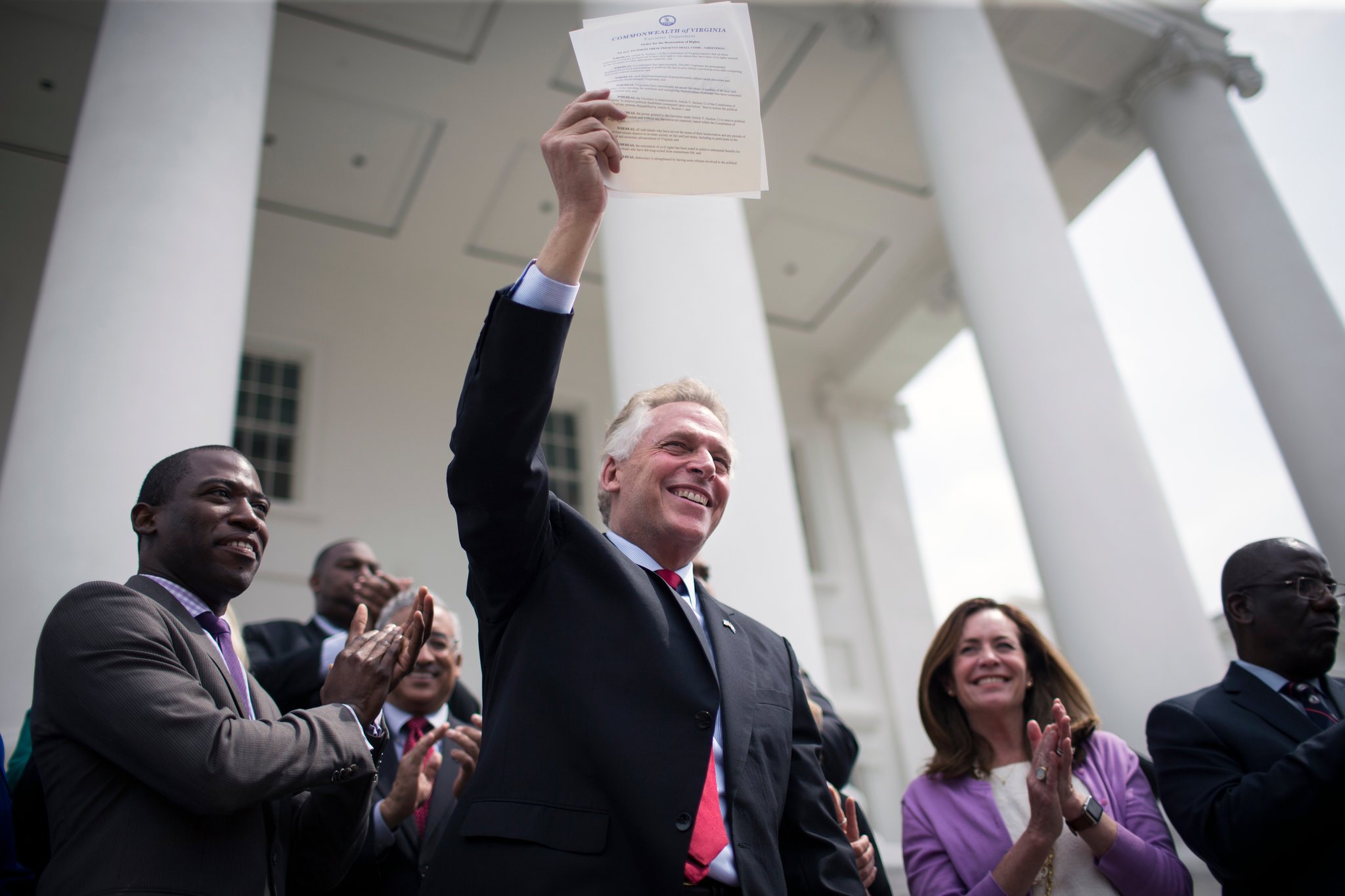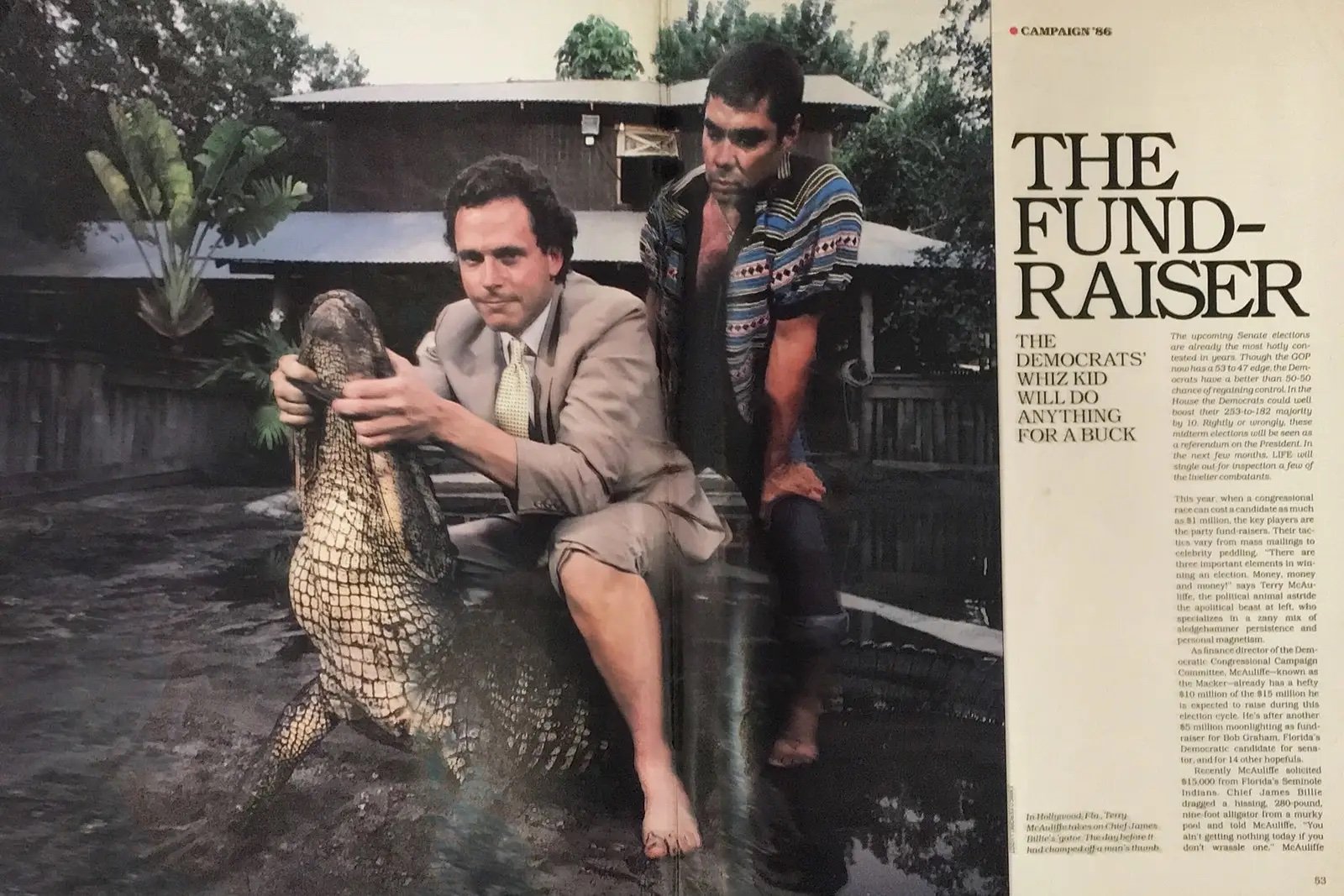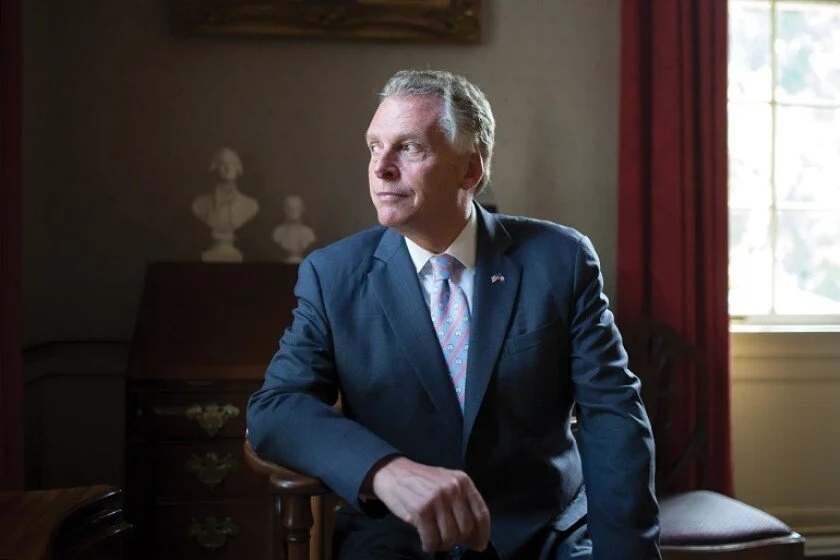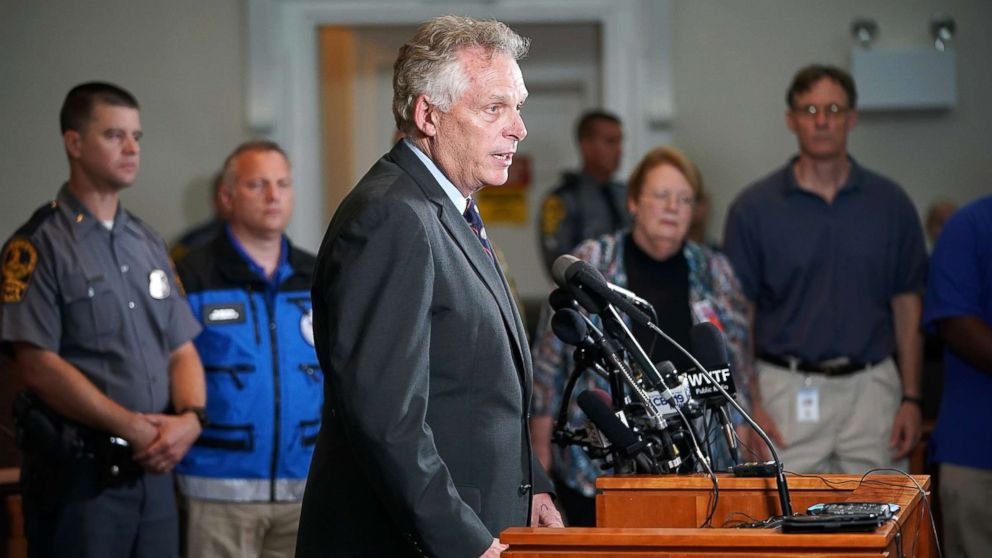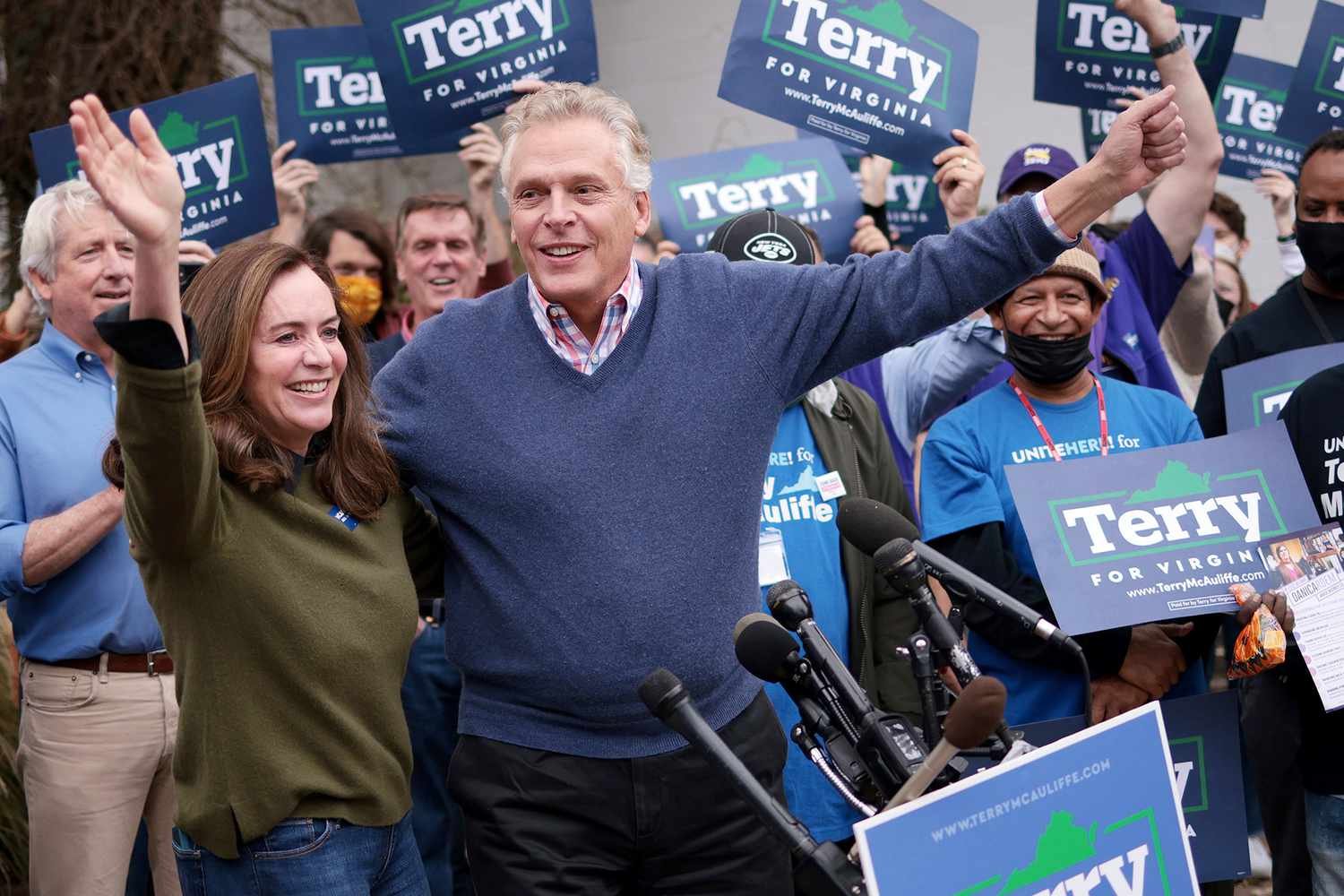Governor Terry McAullife: What It Means To Be a Governor, Democrat, and Leader
Photo via The New York Times
KATHRYN CHAVEZ: Under the word “Democrat” in the dictionary should be a picture of Governor Terry McAullife. A vault of stories, insights, and legislative history of politics past and present, he is eager to share with all who ask. Currently a Fall 2022 fellow at Georgetown’s Institute of Politics and Public Service, the former Virginia governor hosts a weekly discussion group focusing on how to govern a state. Luckily for students, there is not much the alumnus of Georgetown University does not know about campaigning, running a government and the Democratic party.
“I just say to the young people, it matters. It matters who your governor is. I tell people all the time, your governor runs your education, they run your health care, they build your roads, they clean your roads, they prepare for hurricanes and natural disasters. So young people gotta get out there and vote.”
This is the first On the Record interview with the Fall 2022 Fellows; going deeper into who the political professionals currently on the hilltop are and what they bring to the Georgetown community. Click here to learn more about the fellows program.
“So I come from a business background. I started several dozen companies. I started my first business at 14, I had to pay for college. So I got to work and became successful. And, you know, I was the youngest bank chairman in American history. I owned real estate companies and insurance. I'm a real entrepreneur. Never worked for anybody, did it myself, and had huge success and a huge failure. I saw it all as an entrepreneur.”
For most Georgetown students, or those not deep into the world of ’90s and early 2000s politics, Terry McAullife is mostly known as the former Governor of Virginia. Gaining national attention after leading the state through a horrific attack on Charlottesville from neo-Nazi white supremacists, Governor McAullife provided a more realistic narrative of events compared to then-President Trump.
His loss in 2021 to Glenn Youngkin was a surprising turn of events in the state that had so recently voted for President Biden. Fingers have been pointed in every direction, including reasons like Virginia being so closely tied to national politics and the governor's frequent mention of former President Trump. Nevertheless, the election is over, and Georgetown students now get the chance to chat, question and learn from the former Democratic National Committee Chairman and Virginia governor who has heavily shaped the Democratic party into what it is today.
“I got in at a very young age. I was the president's finance director [for now President Bill Clinton’s 1992 election] at the age of 23 years old,” said the Governor. “I was going to Georgetown Law School, but I took a leave of absence when a buddy of mine who worked for the former Chief of Staff to the president said ‘you want to work on the campaign.’”
For most people, joining a campaign at 23 would have been their introduction to life in professional democratic politics, but the governor was already a seasoned professional. With a natural gift for fundraising and nerves of steel, he was able to get people to open wallets and checkbooks for the Democratic cause. His book, “What a Party!”, almost reads like a tall tale due to the lengths he has gone to for donations. Loyal to the party from a young age from his parents' local involvement — his dad served as Onondaga County Democratic Party treasurer — he began a career in fundraising at 22.
“Once you make the commitment, man, I'm gonna get that money. I'm gonna chase you down.”
Photo via Life Magazine and Buzzfeed
While sharing the history of the Governor himself, “What a Party!” is a backstage pass into the world of politics before most Georgetown students were born or could vote. There are chapters on why it is important to take advantage of the time the governor is spending at Georgetown. Looking at the present, the governor was fairly recently in a consequential political office, and it has been less than a year since his last campaign. The governor has seen politics move through the millennium.
“Now a lot of people don't even know, don't understand what happened in 2000. Al Gore actually got more votes than George Bush did in 2000, more votes total. The Supreme Court knew what they were doing, and shut down the recount. To think that they actually stopped a state from recounting its own votes. Historic,” said the Governor. “Then I just said, Okay, we gotta fix our party.”
To understand the impact the governor had on the DNC is to understand what he brings to conversations about politics. The DNC of today is apparently very different from the DNC of the past, as before the governor became chairman, a voter file was non-existent.
“50-60,000 people on the Florida Democratic Party voting rolls, we were calling them, sending them letters in response, they wouldn't respond because they were dead.”
For anyone who works on a campaign in 2022, VAN (Voter Activation Network) is what runs the show. Fundraising was not done on ActBlue, but via physical checks and cash.
Looking at when the governor was on the ballot himself in 2014, it was the internet age. Like many aspects from the 1990s, fundraising got a much-needed upgrade. Supporters were able to give to their candidates online on their own time, with no paper bills or checks needed. The increasing popularity of ActBlue has allowed Democrats up and down the ballot to fundraise online.
“It's different today. The digital dollar, the low dollars have become so important, which is really great for democracy,” said the Governor. “So, online has taken over, which is great, because it brings multitudes and millions of people who will give you 10, 20, 30, 40 bucks, no cost to it. And they're repetitive donors. So the advent of the Internet and digital and online giving has been great for the country. And great for candidates too, if you can tap into it.”
Photo via Governing
Innovation in the workplace is a lesson that Georgetown students would be wise to learn from the Governor. Generation Z’s digital nativeness will bring momentum to update systems and adapt to new norms when they enter the workplace. Building proper media facilities was one obvious way in which the governor brought the DNC into the 2000s. And in his time as governor, he led the effort in the country on cybersecurity and was even elected chairman of the National Governors to assist other governors’ cyber endeavors.
“Virginia is very unique. We have the most military installations, we have the largest naval base in the world. And I think that's a great honor. But it also comes with great responsibility. We have to make sure we are protecting our assets, our information.”
The governor's understanding of what is needed to better ensure the future of our government is why he is at Georgetown right now. His discussion group is themed around how to run a state. And in the digital age, protecting technology and what’s stored on it, is vital. He rightly pointed out that all over the country state governments are hacked, putting sensitive information, such as driver's license numbers, at risk.
Because the governor came from a business background and was an alumnus of one of the most economically successful US presidents, jobs are often included with innovation. “In America, it should always come back to how do we grow business? How do we create jobs?” When the governor left office in Virginia, he had created 40,000 jobs in cyber alone, many of which did not require a four-year degree.
Photo via ABC News
Governor Terry McCauliffe has had a political career that resembles very few. While this article barely scratches the surface of who the governor is, here are three final reasons to round out why having him on campus is notable.
Reason One: He governed through a shocking moment of neo-Nazi white supremacists that was condoned by the sitting president at the time, Donald Trump.
“This guy from Ohio is 21 years old and weaponized his car and ran through downtown Charlottesville and killed Heather Heyer and injured 20 plus people. Then the state police helicopter crashed, which had had my pilot and a former member of my security. So three people died and that all happened within an hour.”
August 12, 2017 was a day of personal loss, as well as statewide grieving for a young woman and a town. The phrase by President Trump after the events of Charlottesville has been written in stone as a defining moment in his presidency, “There were good people on both sides.” Governor Mcauliffe had a more powerful message the day after the attack at Mt. Zion First African Baptist Church in Charlottesville.”
“What I’m asking you today to do is put the anger aside, as I did when I got up this morning,” he continued. “Put it aside. Let us use hope. Let us use today to reach out to our fellow citizens. Let us show these people we are bigger than them. We are stronger than them.”
That weekend, the Governor had to console not only the people of Charlottesville but also his family, as they were close to Berke Bates, the state trooper pilot who died in the helicopter crash that same day. To be a successful governor, one does not necessarily have to face deep moments of sadness and rise above them, but it does show one's character. No matter what line of work Georgetown students choose, learning how to face difficult adversity with strength and a kind message is always worth the time.
Reason Two: Not many people ride bikes with the president through the Eisenhower Executive Building
Jumping back to the 1990s, President Clinton won the election, and the Governor was with him, along for the ride. The governor would hold different titles during President Clinton’s time in the White House, but the most important one was a friend. As cheesy as that sounds, most people cannot say they are personal friends with the president, giving the governor a front seat in navigating the highest office in the world.
There may have been family vacations, holidays at Camp David and dinners with global leaders, but even when removing the glamor and privileges that come with the White House, it is a normal friendship. The only difference, even after 30 years of knowing each other, 22 of which President Clinton has not been in office, the governor still calls him Mr. President. It is clear when talking with McAullife not just how much he admires the Clinton family, but also the respect he holds for those who hold elected office.
Not many people have the same inside scoop into what life is like at the White House and what it means to be in the president's inner circle. Meeting foreign dignitaries, hosting large events and late, late nights, the governor is a walking tell-all book about life at 1600 Pennsylvania Avenue.
“President Clinton is always very good about giving advice. And I mean that in a positive way. So to this day, I still bounce ideas off of him. He's one of the biggest brains I've ever met,” the governor said. “He was a great governor, and he was a great president. He left the office with the highest approval rating of any two-term president in American history. Higher than Reagan, and had two years of budget surpluses, which people find it hard to believe.”
Photo via Associated Press
Reason Three: What it means to raise a family in the political limelight. Life in the McAullife family means playing mermaids with the first lady, dancing with the president at Christmas parties and eating snacks in the Fox News green room.
A career in politics can bring you all over the country, even the world. Late nights and early mornings, choosing to work in government or getting people elected into government is not always the most routine lifestyle. That is why the governor always brings along his family when he can and does not shy away from the fact that his family is important to his success.
Celebrating 34 years with his wife, Dorothy, is not a milestone that everyone who chooses a career in politics reaches. What made the times of separation easier was that she, and the whole family, knew that he was fighting for the right thing, the ideas they all believed in. “She's always been supportive because she knew I was fighting for the things that I believed in, that she believed.” The pair have five children together, who have been instilled with a sense of service, “I tried to instill a sense of duty, honor; you gotta give back. You got to help other people gotta; lift other people.”
While most Georgetown students are not hearing wedding bells and babies' cries quite yet, it is never too early to learn the value of family when working in government.
Photo via People Magazine
“I just tried to fight for what I think is right. Let the chips fall where they may. I never put my finger in the air to see which way the wind is blowing. As governor, I restored more felon voting rights than any Governor in US history. I was then sued by Republicans in the state Supreme Court. It wasn’t about me, it's about 206,000 people who lost their right to vote because of Jim Crow laws going back to 1902. And if you were 18 years old, and you stole sneakers, or whatever, for 100 bucks, you're never gonna vote for the rest of your life. That's just awful. I always leaned in and did the things I thought were right, said the governor. “I always fought hard for what I believed in. Sometimes you lose some of them, sometimes you don’t. You pick up your chips, and you move on, and you got to keep looking forward.”
Photo via Reuters
Kathryn Chavez is a Second Year Master of Public Policy student at the McCourt School. Originally from outside Dallas, Texas, she graduated from Southern Methodist University in 2021 with degrees in Business Management, Advertising and Fashion Media with a minor in Journalism.

